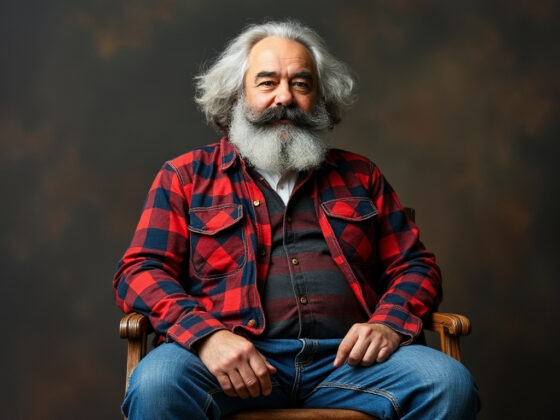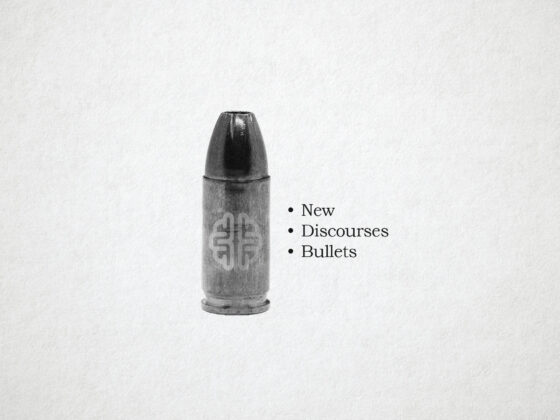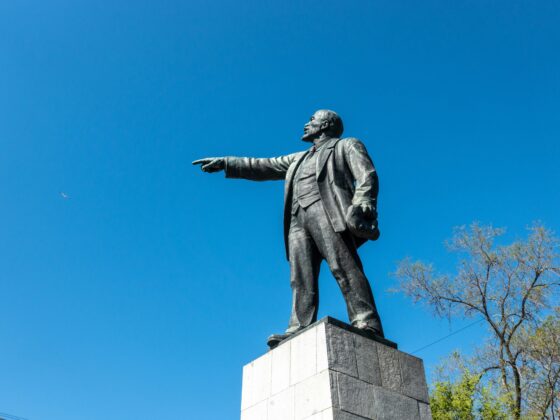The New Discourses Podcast with James Lindsay, Episode 37
Is Critical Race Theory Marxist, as many insist, or is it not? What is the relationship between Marxism, neo-Marxism (Critical Theory), and Wokeness? All three criticize one another, and yet all three have a great deal obviously in common. Is there some common underlying thread between these clearly similar yet obviously different worldviews? The answer is yes, and by tracing back to one of the most influential speculative idealist philosophers of the early 19th century, namely George Wilhelm Friedrich Hegel, we can gain a great deal of insight into how these decidedly leftist movements—the Marxist Old Left, the neo-Marxist New Left, and the intersectional Woke Left—share at least one deeper philosophical architecture in common. From Hegel, the Left since his time has, wittingly and not, adopted several of the pillars of Hegelian philosophy, these including his statism, historicism, and, much more importantly, his dialectical approach and metaphysical worldview. In this episode of the New Discourses Podcast, James Lindsay takes a long, deep dive into the ways that Hegel’s philosophy is at the root of the entire “Dialectical Left” since, naming the dialectic the “operating system” of all activist Leftism since the early 1800s.
In this episode, Lindsay takes considerable time explaining Hegel’s view of dialectical thought and then reveals in many examples, reaching up to the present day, how consistently the dialectic appears as the functional underpinning of Leftism ever since, at the latest, the 1830s. He makes the case that Leftism since Hegel thinks dialectically, moves dialectically, and applies dialectical thought not just to its targets but to everything, including itself and even its own dialectic. He then switches gears and explains how the dialectic is central to Hegel’s underlying Hermetic (or alchemical) worldview and explains his mystical metaphysics so that this long arc of Leftist activism can be understood as evolving denominations within a single religious faith. With this theoretical groundwork laid, he then tackles how Hegel’s historicism and statism arise as key features of his philosophy, with both of these characterizing activist Leftism up to the present day. Join him for his longest and most in-depth discussion yet, taking on how Hegel is a key progenitor of communism, liberationism, and ultimately Wokeness, how this philosophy must be understood so that it can be countered, and why it should be thought of in the same way that Hegel thought of it: as a religion in its own right, with its own notion of deity, metaphysical commitments, soteriology, and eschatology.
Subscribe to the New Discourses podcast on SoundCloud, Apple Podcasts, Google Podcasts, Spotify, Stitcher, YouTube, or by RSS.
Previous episodes of the New Discourses podcast are available here.










13 comments
However, it must be emphasized again and again that Hegel himself was not a leftist (Left Hegelian), but the original Hegelian, namely Hegel.
James Lindsay is from the USA. The nation USA has no history. It is historyless. It is a fact that history is necessary for the formation of identity. If history is missing, identity formation is limited. Substitute identities are then formed, and that is exactly what has been happening in the USA from the very beginning. And that is also the reason why Lindsay cannot empathize with people with whom he should actually share an identity, because Lindsay is of European descent, but is not allowed to be. He simply ignores the fact that Hegel was NOT a leftist. If Hegel enabled the Left-Hegelians – and indeed he did, just as he enabled the Center-Hegelians and the Right-Hegelians – that does not mean that he himself belonged to them, and he did NOT belong to them, because he was not his own disciple, but just himself.
An example:
Mr H. invents the sport of football, i.e. the corresponding exercises in combination with motivation, as well as the corresponding rules. The main rule is: „The winner of the football match is the team that scores more goals than the opposing team“. – 50 years later, Mr M. turns Mr H.’s rules on their head. The main rule is now: „The winner of the football match is the team that scores fewer goals than the opposing team“.
Question: Is it Mr H.’s fault that his rules have been put on his head by Mr M.?
Answer: No.
Marx turned Hegel’s philosophy on its head. Is that Hegel’s fault? No. Of course it’s not Hegel’s fault.
______________________________________________________________________________________________________________________________________________
Please do not get me wrong, I have nothing against James Lindsay, I have just criticized some aspects. Like him, I am very strongly against any kind of „cultural revolution“.
______________________________________________________________________________________________________________________________________________
My criticism of James Lindsay is merely that he does not say clearly enough that Hegel was not a leftist and especially not a Marxist. But Marx was a leftist (Left-Hegelian). But that’s not Hegel’s fault. In addition, he was already dead at that time.
And Lindsay himself says that he fixes the birth of the left at the year 1831 (**|**), more precisely, after Hegel’s death: 14. November 1831. Lindsay just does not always say this clearly enough, which is important, because most people do not know much.
According to Lindsay, the current„regime“, as he calls it, is similar to Marxism, so one may get the impression that he means that the „regime“ is made up of Marxists, which may well be, but it doesn’t have to be. It may also be the case that the „regime“ has put itself in a situation from which it want to break out, but can’t, so it grasps at straws to postpone the negative consequences of its own failures, which only leads to them becoming even greater. The „regime“ postpones by having to link Marxism, the equally absurd Club of Rome (it predicted in 1972, among other things, that e.g. copper and aluminum would no longer exist on earth in the year 2000 and we would therefore become extinct) with all the diversionary maneuvers and divide-and-conquer games, because it has no other choice anymore.
The Marxists lie in order to enrich themselves. Their totalitarian ideology is the ideal tool for making as many people as possible equally poor, equally stupid, equally brainwashed and for gradually reducing the population to one person. It is not the allegedly disadvantaged who become richer and more powerful, but the very few who allegedly „represent“ the allegedly disadvantaged politically, legally, ecclesiastically, „open-society“-wise and otherwise. We know this from history: by far the most murdered people in world history were in China and the Soviet Union, who were only murdered because they had a very little bit more than the allegedly disadvantaged – 600 million people paid with their lives for this madness.
About 100 years ago, Oswald Spengler warned against this, calling the original „Weltrevolution“ („World Revolution“) the „Weiße Weltrevolution“ („White World Revolution“) and the subsequent „Farbige Weltrevolution“) „Colored World Revolution“, because he knew that classism and racism would relatively soon unite against the white race. In addition to these two massive movements, there is another massive one that Spengler was already familiar with: the women’s movement. If we call these three movements WCF (white, colored, female) for short, then we have to supplement all the nonsense today with LGBTQIA… x… and Woke etc., only to notice at some point that there may be no one left to exploit.
Leftists can only exploit as long as they have time, because after a certain time all exploitable people are exploited or dead.
Went through this whole podcast, so informative. Marx calls religion the “sigh of the oppressed” and “opium of the people.” Those words should actually refer to the Hegelian Religion/Marxism itself!
I just found this, someone from the former USSR claims that he has a piece of paper where Marx himself purportedly scribbled alchemic ideas. If confirmed (but it likely may never be), this cements the idea that Marx was an alchemist and therefore all his stuff is pseudoscience.
https://www.e-flux.com/journal/124/447408/marx-the-alchemist/
Most crucial to Hegel, and taken up by Marx, and now taken up as the basis of the self-assurance of Neo-Marxist, is the idea that History is a kind of “God” that makes good things evolve out of chaos. This is why they don’t feel they need to do more than destroy, to liberate History from the shackles of the status quo. This is why they don’t think they need to explain what Utopia is going to look like, or how we’re exactly going to get there — History will take care of all that. History itself is the Woke God. It will lead us to future perfection, even if screw everything up right now; so long as we never let anything become reified or settled into a status quo that prevents us moving forward by History’s beneficent power.
Without that faith, Neo-Marxism would have too little that’s constructive to propose, too many practical problems to solve, and too many impossible questions to answer. So it simply defers them all to no definite time in the future, “punting” them to History.
Dr Jacob Bronowski shared a though about Hegel in his series Ascent of Man.
http://www.dailymotion.com/video/x20ohne_bbc-ascent-of-man-11-knowledge-or-certainty_tv
James, cannot thank you enough for doing the yeoman’s work of translating the gigantic mess of verbiage that is Wokeness/Marxism/CRT/Theory into something slightly more comprehensible. I also read your book on Cynical Theories. I still have trouble wrapping my head around “dialectic” because the original writings use language in ways I do not, and even much of what you say must be listened to repeatedly just to get a non-verbal concept of it. Actually grokking it will take much more work.
it interests me that, long ago when I first read the philosophical essays by Ayn Rand, she too traced leftism back to Hegel – and also Kant. She had more to say about Kant than Hegel, but my impression was that Hegelianism equalled a chaotic view of reality. The verbiage around all of this confirms that view.
I also have HUGE gratitude for your essay on vaccine hesitancy. Makes sense.
I get my money’s worth as a subscriber.
The problem with conservatives is that they want to find one organizing idea for all currents on the left. The problem is that there isn’t one organizing principle and different currents have completely different organizing principles. Maybe what some conservatives and leftists have in common is a search for this one organizing principle but most people on the left think that history is filled with contingencies that interrupt progress for the possibilities of a better life for humanity just as contingencies interfere with humans wanting better lives for themselves. Nature and history include chaotic systems. Maybe some on the left and right think that the intellect can figure out those systems entirely but mature people know there are extreme limits to this. Is a better social and political life possible for human beings? The jury is out but working for social progress toward more equality of opportunity is something that I choose to do. That requires more commitment than faith although some faith in the possibility of social progress is necessary. The common faith of conservatives seems to be that unrestrained capitalism is the ideal and fulfillment of history. But that seems to be breaking down into more authoritarian currents of theocracy. Both the left and right in the United States are fragmented and fractured.
Most leftist today don’t accept the details of Hegelian philosophy at all especially in the United States. The one idea they borrowed from Hegel or perhaps more accurately from Kant is the enlightenment idea that human culture is progressive, i, e., that we humans gain insight into the nature of reality as culture progresses. The idea that this happens dialectically by systems of historical philosophy negating other systems of philosophy dialectically is almost universally rejected by leftists. Most leftists on the cultural left have rejected Hegel completely and thoroughly. The idea of being “woke” isn’t an idea I hear mentioned on the left at all. I don’t know what it’s origins are but I don’t know a single leftist that has some notion of “wokeness”. The cultural left has some organizing ideas about the human rights of minorities and women’s rights but to somehow think that this requires some sort of Hegelian faith is absurd. It does require faith that humanity can and should progress toward egalitarian ideals but certainly Hegel did not think that was the case. He was relatively conservative and thought the German state was somehow the fulfillment of history.
Found this interesting argument against dialectical materialism made by a Marxist contending that DM is responsible for the multiple failures of Marxism last century. IMHO Marxism is pure malevolence in that it’s obsessed with power struggles between classes and groups in society rather than the Western Liberalism view that communication between groups to find common cause is the foundation of the Social order
Marxist anti-dialectics exposes the stupidity of DM
http://www.anti-dialectics.co.uk/Why%20I%20Oppose%20DM.htm
This is a super helpful podcast. I listened and commented on YouTube.
Did you read ‘Hegel and the Hermetic Tradition’ by Glenn Alexander Magee as part of your research? It felt like you touched on areas that this book covers, if you haven’t I think you would gain further insight and understanding into the influences of Hegel.
Another branch that extends from Hegel (or at least his influences) into modernity that might be worth exploring is
Hegel —> Theosophy —> Helena Petrovna Blavatsky —> Alice Bailey —> Lucius Trust —> United Nations
keep up the great work!
You may appreciate this video on the road back from Clown World Dr. Lindsay.
https://www.youtube.com/watch?v=HUWPua648Jk
“Both tendencies culminate in Hegel: at bottom, what he did was to generalise the
fact of German criticism and the fact of German romanticism,—a kind of dialectical
fatalism, but to the honour of intellectuality, with the actual submission of the
philosopher to reality. The critic prepares the way: that is all!”
The Will to Power